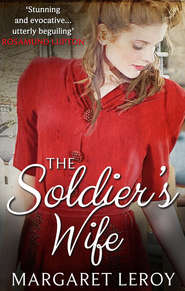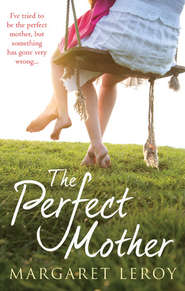По всем вопросам обращайтесь на: info@litportal.ru
(©) 2003-2024.
✖
The Drowning Girl
Автор
Год написания книги
2018
Настройки чтения
Размер шрифта
Высота строк
Поля
Sometimes I thought of Dominic, imagined that maybe he’d come. It was just a little bright flicker of hope that wouldn’t be extinguished—like those novelty birthday-cake candles that keep relighting however often you blow on them, that simply won’t be put out. In my half-hallucinatory state after the nights of insomnia, I’d think I could hear his voice, which is rather loud and authoritative when he isn’t being intimate, or his firm step coming down the ward. I’d picture it all, too vividly: how he’d come to my bedside and scoop Sylvie up in his arms and hold her against him; staring at her as I did, loving her as I did. I couldn’t stop thinking these things. Though the rational part of me knew it was just a crazy fantasy—it was spring half-term, he was probably skiing at Val d’Isère with his family.
I was aware of a woman watching me from the opposite side of the ward: dark hair trimly pulled back, a serious, sensible look. She had an older boy and a constant stream of visitors. I knew that her baby was called Lennie: that she’d been born a little early, and had lots of bright black hair that would fall out in a day or two. This woman noticed things, I could tell that. I knew she’d have seen I hardly had any visitors. Just Lavinia, my boss, who came dripping beads and bracelets, with a worn, exquisite silk scarf that she’d found in a Delhi market looped around her head, and bearing greetings and gifts. Some woolly things she’d knitted and some Greenham Common wire that she’d kept since the seventies, when she’d gone on an Embrace the Base demonstration with thousands of other women and had cut off a bit of the boundary fence with wire-cutters; and a tape of whale sounds that she promised would help Sylvie sleep. Flowers, too, of course, a lavish bunch of them, the yellow day-lilies I love. My life was far from perfect, but at least I knew my flowers were the loveliest on the ward.
She peered down at Sylvie.
‘She’s so beautiful,’ she said. ‘Little bud.’ Touching her with one finger, on her brow, like a blessing. ‘Little perfect thing.’ And then, hugging me close, ‘You’re so clever, Gracie!’
I was happy with Lavinia there; it was almost like having my mother back. But after she’d gone I cried, I couldn’t stop crying, holding Sylvie to me, pushing the tears away so they wouldn’t fall on her face.
Karen came over then, Lennie in one hand, box of Milk Tray in the other. She sat beside me and put the chocolates down on my bed.
‘It can all feel a bit much, can’t it?’ she said. ‘Last night I had to sit in the bath for hours before I could pee. And that bloody woman who came round this morning to talk about contraception. I told her that intercourse wasn’t exactly top of my To-Do list at the moment…’ She pushed the chocolates towards me. ‘Come on, get scoffing. You need to keep your strength up.’
Watching me, her clear steady gaze. She knew it wasn’t the pains of birth that made me cry. But we bonded over these things, the scars and injuries of labour. She lent me a rubber ring to sit on, which helped with the pain from the stitches; she was a great advocate of salt baths; she fed me on her chocolates. And I told her about Dominic, and she listened quietly. Knowing her as I do now, I can see how generous she was to me. Karen is a traditional wife: there’s a deep conservatism in her. She reads newspapers that are full of adultery stories, and photos of once-glamorous women who dress too tartily for their age. She buys whole books about how to bake cakes. She might well have judged me: that would have been her instinct. Yet she was so accepting: she welcomed me into her life. And I’ve always been grateful for that, the way she reached out to me then.
‘Look at our two,’ she’d say. ‘Astrological twins. We must meet up when we’re home. They could grow up together…’
I go to the kitchen to ring.
‘Karen. I’m so sorry. It was such a great party. Your Hallowe’en parties are always so brilliant,’ I say. ‘She loved it. Really. The magician and everything…’
I can hear Mozart playing in her living room.
‘I shouldn’t have forgotten about the water thing.’ Her voice has an anxious edge. ‘It’s not like you hadn’t told me. I was stupid, I should have warned him.’
‘No, it’s my fault,’ I tell her. ‘I should have kept an eye on her. I hope we didn’t spoil anything.’
‘For God’s sake,’ says Karen. ‘It’s just a shame you had to leave…’
‘Yes,’ I say.
There’s a little silence between us. The music spools out, the balanced phrases, perfect, poised. I don’t want to hear what I know she is going to say.
‘Grace, I hope you don’t mind me mentioning this.’ There’s caution in her voice, she’s choosing her words with care. ‘But we think you really need to get help.’
I feel a kind of shame.
‘All kids have tantrums, don’t they?’ I say. ‘I just try not to get too worked up about it.’
‘Of course all kids freak out sometimes,’ she says. ‘But not like this, Grace. Not like Sylvie… She just sounds so—well—desperate…’ And, when I don’t say anything, ‘Basically, Grace, we think you need to see someone. A psychologist. Someone professional.’
I hate the ‘we’. I hate to think of them sitting there in Karen’s opulent kitchen, discussing me and Sylvie.
CHAPTER 2
When I get to Jonah and the Whale on Monday morning, Lavinia is already busy. She’s taken down the pumpkins from the Hallowe’en display, and she’s potting up autumn gentians on a table of curled wrought iron; the table is rusting but elegant, one of her flea-market finds. She has lots of bracelets on her wrists, and she’s fixed back her hair with a sweep of magenta muslin, a tie-dyed scarf from Gujerat, which has a long silky fringe and a gold thread woven through. The thick, sweet smells of the flower shop wrap themselves around me—wet earth and mingled pollens.
Lavinia is a widow, her husband was an orthopaedic surgeon and I always feel he was a difficult man—though she only ever speaks of him with affection. He died ten years ago, of cirrhosis of the liver. She’d been a physiotherapist and opened the flower shop after his death with the insurance money, wanting to make a fresh start. ‘Why “Jonah and the Whale”?’ I asked once, expecting something deep about loss and new beginnings, but she smiled in that way she has—enigmatic, a little self-mocking—and said that she just liked the way it sounds. She lives alone, but she never seems lonely, she knows so many people—Buddhists, artists, performance poets, from her hippy days. On Sunday, she tells me, she had three rather decrepit musicians round for paella, and they played Cole Porter in her living room.
I tell her about the party, about what happened with Sylvie. She turns to me and listens till I’ve finished, her quiet eyes taking me in.
‘Poor kid,’ she says then. ‘Poor you.’
Her eyes linger on me. There’s a little crease pencilled between her brows. She never gives me advice, and I’m grateful for that.
I put flowers out on the pavement at the front of the shop—buckets of lilies with reddish pollen that stains your skin like turmeric; hydrangeas of the richest, densest blue. I’ve planted the hydrangeas into azure metal pots, choosing the containers with care. I love the way the clashing colours seem to shimmer and sing. There’s a winter rawness in the air, the cold scrapes at my skin. My hands are always chapped, working here. I own numerous pairs of fingerless gloves that I dry out on the hotwater pipes in the back room near the boiler, and I change them during the day and yet, whatever I do, in winter I’m never quite warm.
It’s a slow morning, as Mondays usually are, and Lavinia sends me off in my car to do the deliveries. First a big traditional bouquet, roses and carnations, for a silver wedding. The woman who answers the doorbell has stiff, curled hair and a ready smile, and behind her an orderly house that smells of lavender polish and detergent. This fascinates me always, the glimpses of people’s houses, these slivers of other lives. Next, there’s a planted arrangement, some winter cyclamen, for a nervous young woman whose hair falls over her face. The cyclamen seem so right for her—these fragile, pale, self-deprecating flowers. She stands on her doorstep and looks at me with an uncertain, surprised air—as though this is all a mistake, as though she feels she’s not the kind of woman people would buy flowers for. As she talks she keeps touching the side of her face, in a little self-comforting gesture. I drive away, feeling a loneliness that might be hers or mine.
The last call is to one of those modern estates where the numbering doesn’t make sense. I need number 43, but 37 seems to lead straight to 51. I stop the car and get out, walk down the road and peer into all the alleyways, trying to find the right house.
It’s how I met Dominic, delivering flowers. I was eighteen. I’d only just begun working for Lavinia. I was thrilled with the job after temping in tedious offices ever since I’d left school.
It was a planted arrangement—the most expensive we do—in a wicker basket. I’d written out the card myself; I’d been the one to take the call. An older woman, a privileged voice, with cool, immaculate vowels. Happy Birthday, dearest Claudia, with all my love, Mama. A spiky bit of wicker from the basket had worked loose, and as I took the flowers out of the car I snagged my finger. The cut was surprisingly deep. I wrapped a tissue round it. The blood soaked rapidly through, but I only noticed after I’d rung the bell.
He was a big man, forty-something, and wearing a linen shirt with rolled-up sleeves. He looked at me as though I amused him. I was wearing my usual kind of outfit: a little cord skirt and stripy tights and boots with high, spindly heels—too high to drive in, really. I was suddenly very aware how short my skirt was.
‘Flowers for Claudia Runcie,’ I said.
He was looking at me; he didn’t look at the flowers. He still had that pleased, amused air.
‘Well,’ he said.
He took the basket from me and noticed my hand.
‘Whatever happened?’ he said.
‘I cut it,’ I said.
‘OK. Stupid question,’ he said. ‘You’d better come in. You’re dripping on my doorstep.’
He thrust a huge handkerchief at me. I wrapped it round my hand.
It was a large airy kitchen, with that pale, distressed kitchen furniture that looks as though it’s been sourced from some Provençal street market. I thought, If I had aproper kitchen, this is exactly how I’d like it to look. There were photos on the mantelpiece, of a boy and a girl, black and white, in silver frames. The photos were rather beautiful, soft focus, cleverly lit. There were masses of birthday cards and a silver helium balloon, for Claudia presumably.
‘I’m Dominic,’ he said.
I told him my name.
He hunted in the drawers of the cabinets for an Elastoplast.
‘Where the hell does she keep them?’ he said.
I had an immediate sense of his wife, of Claudia, as the centre of things, the heart of the home, the one who held it together: who knew the best photographers and where to find exquisite kitchen units and whose Elastoplasts had their allotted place in her drawer. I sensed his absolute dependency on her. What I didn’t know then, but was soon to learn, was that they never made love: it was a comfortable, prosperous marriage but with no sex or closeness. At least, that’s how he told it.
He found the packet of plasters. I put out my hand, but he’d taken one out and was peeling off the backing.
‘Give me your finger,’ he told me.









